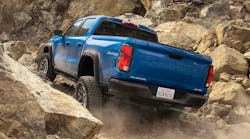It used to be that the last thing fleets ever wanted to see was their truck leading off the news because it was involved in an accident. Executives would just hope and pray that people decided to skip the evening news in that particular market on that day. But then the Internet came along and with it web sites like YouTube and LiveLeak that made it possible for anyone with a home video camera to post their footage for the world to see. To make matters worse, the increasing number of traffic cameras in major metropolitan areas also makes it a lot easier for authorities, and eventually the public, to review the details that led to an accident.
A recent event involving a tanker trailer's tire and a mini-van has received thousands of views, and it's impossible to guess how many people downloaded the footage and then forwarded it to all of their friends. Fortunately, the driver of the mini-van was not killed, but his vehicle was destroyed when the truck's tire bounced over the median and into the oncoming van. It was a scary reminder of the serious damage that can be caused by a run-away inflated truck tire on an Interstate highway. Thousandths of a second and just a few inches separated a property damage claim from a fatality and in this case, the fleet got lucky.
Another quick search yielded some lovely shots of a container and chassis operating with a flat tire that was disintegrating with each revolution and plenty of accidents that involved trucks. One of the most disturb-ing was a wheel-off accident that killed a doctor in the Midwest. Footage leading up to the accident showed nothing dramatic and received only a few thousand views, but the newscast that revealed the name of the trucking company involved has received almost 57,000 views. The driver's name and picture, as well as the company name, were prominently displayed throughout the broadcast.
Every accident has the potential to live for eternity on the Internet, and for the wrong fleet at the wrong time it could become another Zapruder film. Given the seriousness of the consequences following a wheel-off incident, every fleet should take any and all precautions to ensure the tire and wheel assemblies stay on the vehicle until they are ready to be removed by a trained and qualified technician. The most important thing to remember is that proper torque is only part of the equation, so the answer isn't to run out and spend a ton of money on tools that don't solve the problem. Proper torque is just one element of a wheel retention program. Fleets interested in limiting the chances of a wheel-off must buy into the system approach.
Without a doubt, the most important component of the system is the technician who ultimately cleans, inspects and installs the components. Applying torque to the fasteners is also dependent on a technician who understands all the steps necessary to ensure that the torque creates sufficient clamping force to retain the wheels in service. And finally, the driver plays a critical role because many wheel-off accidents occur within the first 50 to 100 miles of service, so they should at least stop and check the wheels following service on the road or at the maintenance facility. Nothing guarantees that wheel-offs will cease to occur, but training and preventive maintenance can definitely cut the risk.


